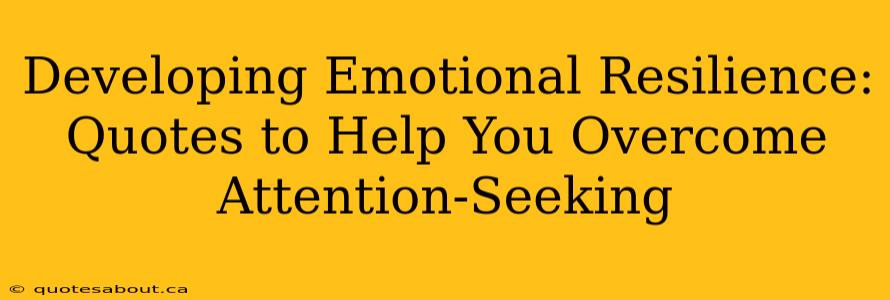Attention-seeking behavior, while often stemming from a need for validation and connection, can be detrimental to personal growth and healthy relationships. Developing emotional resilience is key to overcoming this behavior and building a stronger sense of self. This involves understanding the root causes, developing coping mechanisms, and fostering self-compassion. This article explores how emotional resilience can help you navigate attention-seeking tendencies, incorporating insightful quotes to guide your journey. We'll also address some frequently asked questions about attention-seeking behavior and its management.
Understanding the Roots of Attention-Seeking Behavior
Before diving into solutions, it's crucial to understand why someone might engage in attention-seeking behavior. Often, it's a coping mechanism for underlying insecurities, unmet needs, or past trauma. It can be a way to fill a void, regulate emotions, or seek connection in unhealthy ways. Recognizing this root cause is the first step towards building emotional resilience.
"The most common way people give up their power is by thinking they don't have any." - Alice Walker
This quote highlights the importance of recognizing your inherent strength and ability to change your patterns. Attention-seeking often stems from a feeling of powerlessness; reclaiming that power is a crucial aspect of recovery.
Developing Coping Mechanisms for Attention-Seeking Tendencies
Building emotional resilience requires actively developing healthy coping mechanisms. This involves learning to self-soothe, manage emotions effectively, and find healthier ways to meet your needs for connection and validation.
-
Mindfulness and Self-Awareness: Practicing mindfulness can help you become more aware of your thoughts, feelings, and behaviors. This heightened awareness allows you to recognize when you're engaging in attention-seeking behaviors and make conscious choices to shift your approach.
-
Setting Boundaries: Learning to set healthy boundaries is crucial. This means saying "no" when needed, protecting your time and energy, and prioritizing your well-being.
-
Building Self-Esteem: Cultivating self-esteem involves focusing on your strengths, accomplishments, and positive qualities. This helps reduce the reliance on external validation.
"The only person you are destined to become is the person you decide to be." - Ralph Waldo Emerson
This powerful quote emphasizes the agency you have in shaping your future self. By consciously choosing healthier coping mechanisms, you are actively shaping a more resilient and self-assured individual.
How Can Emotional Resilience Help Overcome Attention-Seeking Behavior?
Emotional resilience acts as a buffer against the negative emotions that often drive attention-seeking. By developing skills in self-regulation, emotional processing, and problem-solving, you can navigate challenging situations without resorting to unhealthy behaviors.
Resilience allows you to:
- Bounce back from setbacks: When faced with rejection or criticism, resilience helps you process these experiences without spiraling into attention-seeking behaviors.
- Manage difficult emotions: Instead of seeking external validation to soothe negative emotions, you learn to regulate them internally.
- Build healthy relationships: By focusing on genuine connection rather than attention, you cultivate more meaningful and supportive relationships.
What are Some Techniques to Improve Emotional Resilience?
Several techniques can strengthen emotional resilience. These include:
- Cognitive Behavioral Therapy (CBT): CBT helps identify and change negative thought patterns and behaviors.
- Mindfulness Meditation: Regular meditation helps cultivate self-awareness and emotional regulation.
- Journaling: Writing down your thoughts and feelings can help process emotions and identify triggers.
- Seeking Support: Connecting with a therapist or support group can provide guidance and encouragement.
How Do I Stop Seeking Attention?
Stopping attention-seeking behavior requires a multifaceted approach. It's not a quick fix but a journey of self-discovery and growth. Focus on:
- Identifying your triggers: Understanding what situations or emotions lead to attention-seeking behavior is crucial for developing effective strategies.
- Developing healthy alternatives: Find healthy ways to meet your needs for connection, validation, and emotional regulation.
- Practicing self-compassion: Be kind to yourself throughout the process. Change takes time and effort.
What are the Signs of Someone Seeking Attention?
Signs of attention-seeking behavior can vary, but common indicators include:
- Excessive need for validation: Constantly seeking approval or reassurance.
- Dramatic or exaggerated behavior: Overreacting to situations or seeking attention through emotional displays.
- Difficulty coping with criticism: Becoming highly defensive or upset when receiving feedback.
- Engaging in risky behaviors: Seeking attention through dangerous or self-destructive actions.
"The oak sleeps in the acorn; the bird waits in the egg; and in the highest vision of the soul a waking angel stirs. Dreams are the seedlings of realities." - James Allen
This quote speaks to the potential for growth and transformation that lies within. Overcoming attention-seeking behavior is a process of nurturing that inner potential and allowing your true self to flourish.
By understanding the roots of attention-seeking behavior, developing effective coping mechanisms, and cultivating emotional resilience, you can embark on a journey toward a more fulfilling and authentic life. Remember, the process requires patience, self-compassion, and a commitment to personal growth.

